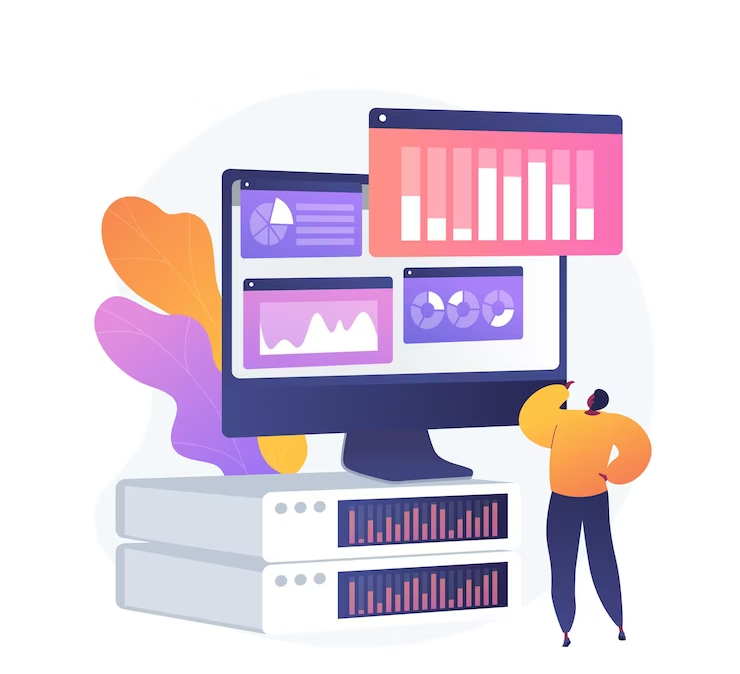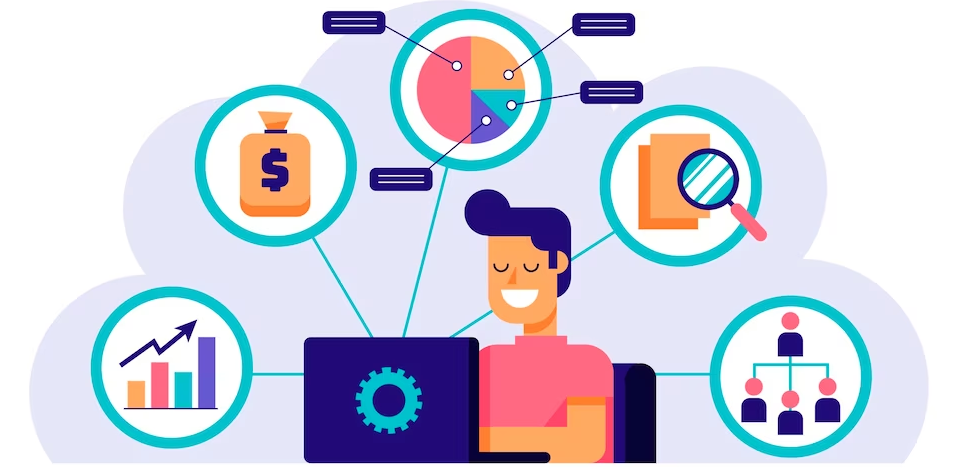ERP (Enterprise Resource Planning) is a type of software that is used by businesses to manage their core business processes such as accounting, inventory management, human resources, and customer relationship management. There are different types of ERP system explained as follows.
Types of ERP System:
On-Premise ERP System
An on-premise ERP system is a type of enterprise resource planning software that is installed and runs on the company’s own servers, typically located in-house or in a data center. This means that the company has full control over the ERP system and its data, as well as the responsibility for maintaining and updating it.

On-premise ERP systems can offer several advantages, such as:
- Greater control: Companies have complete control over their ERP system and data, which can be important for regulatory compliance or security reasons.
- Customization: On-premise ERP systems can be customized to meet specific business requirements, as companies have access to the underlying software code.
- Integration: On-premise ERP systems can be integrated with other in-house systems, such as legacy systems or custom applications.
However, on-premise ERP systems also come with several disadvantages, such as:
- Higher upfront costs: Companies have to purchase and maintain their own hardware, as well as pay for software licenses and implementation costs.
- IT resources: On-premise ERP systems require in-house IT resources to manage and maintain the system, including software updates, backups, and troubleshooting.
- Scalability: On-premise ERP systems may be less scalable than cloud-based systems, as companies may have to invest in additional hardware and infrastructure to accommodate growth or peak demand.
Cloud based ERP
A cloud-based ERP system is a type of enterprise resource planning software that is hosted on the cloud, usually by a third-party provider. This means that the company does not have to purchase and maintain its own servers or hardware. Instead, the software is accessed through a web browser or mobile application, and data is stored in the cloud.

Cloud-based ERP systems offer several advantages, such as:
- Lower upfront costs: Companies do not need to invest in their own hardware, infrastructure or software licenses, which can significantly reduce upfront costs.
- Scalability: Cloud-based ERP systems can be scaled up or down based on the company’s needs, which makes it easier to accommodate growth or sudden changes in demand.
- Accessibility: Cloud-based ERP systems can be accessed from anywhere with an internet connection, which makes it easier for remote workers or employees who are on the go to access the system.
- Automatic updates: Cloud-based ERP systems are updated automatically by the provider, which reduces the burden of software maintenance and ensures that the system is always up to date.
However, cloud-based ERP systems also come with some disadvantages, such as:
- Security concerns: Storing data in the cloud may raise concerns about data security and privacy, especially for companies that deal with sensitive or confidential data.
- Internet dependency: Cloud-based ERP systems rely on internet connectivity, which can be a problem if there is a network outage or slow internet speeds.
- Customization limitations: Cloud-based ERP systems may have limited customization options compared to on-premise systems, which may limit their flexibility to meet specific business requirements.
Hybrid ERP System
A hybrid ERP system is a type of enterprise resource planning software that combines both on-premise and cloud-based systems. This allows businesses to keep sensitive data on-premise while leveraging the benefits of the cloud for other functions.

Hybrid ERP systems offer several advantages, such as:
- Flexibility: Hybrid ERP systems offer the flexibility to choose which data and functions are managed on-premise and which are managed in the cloud.
- Cost-effectiveness: Companies can save money on hardware and infrastructure by using the cloud for less sensitive data and functions, while still retaining full control over their critical data.
- Scalability: Companies can scale up or down their use of cloud-based functions as needed, making it easier to accommodate growth or changes in demand.
- Integration: Hybrid ERP systems allow companies to integrate their on-premise systems with cloud-based applications, allowing for greater functionality and automation.
However, hybrid ERP systems also come with some disadvantages, such as:
- Complexity: Hybrid ERP systems can be complex to set up and maintain, as they require integration between on-premise and cloud-based systems.
- Security concerns: Companies must carefully manage their data to ensure that sensitive information is not stored in the cloud, which can create security risks.
- Potential for data inconsistencies: Data stored in different locations can lead to inconsistencies if not properly managed, which can affect business processes and decision-making.
Open-Source ERP System
Open-source ERP is a type of enterprise resource planning software that is built on open-source technology, which means that the software’s source code is publicly available and can be modified and distributed by users.

Open-source ERP systems offer several advantages, such as:
- Cost-effectiveness: Open-source ERP systems are often free to use, which can significantly reduce costs for companies that would otherwise have to purchase proprietary software licenses.
- Customization: Open-source ERP systems offer greater customization options than proprietary software, as users can modify the source code to meet specific business requirements.
- Flexibility: Open-source ERP systems offer greater flexibility than proprietary software, as users can modify and distribute the software as needed.
- Active community: Open-source ERP systems often have a large and active community of developers and users who can provide support and contribute to the development of the software.
However, open-source ERP systems also come with some disadvantages, such as:
- Technical expertise: Open-source ERP systems can be difficult to set up and maintain, as they require technical expertise and knowledge of programming languages.
- Limited support: Open-source ERP systems may not come with the same level of support and documentation as proprietary software, which can make it difficult to resolve technical issues.
- Security concerns: Open-source ERP systems may be more susceptible to security vulnerabilities, as the source code is publicly available and can be modified by anyone.
- Lack of features: Open-source ERP systems may not have the same level of features and functionalities as proprietary software, which can limit their usability for some businesses.
Industry-Specific ERP System
Industry-specific ERP (Enterprise Resource Planning) systems are enterprise software solutions designed to meet the specific requirements of a particular industry or sector. These systems are built to cater to the unique needs of different industries and can help businesses streamline their operations, increase efficiency and reduce costs.

Examples of industry-specific ERP systems include:
- Manufacturing ERP: Designed for manufacturing companies, these systems help manage production processes, inventory control, supply chain management, and quality control.
- Healthcare ERP: Designed for healthcare providers, these systems help manage patient information, billing and insurance, scheduling, and clinical workflows.
- Retail ERP: Designed for retailers, these systems help manage inventory control, customer relationship management, point-of-sale transactions, and supply chain management.
- Construction ERP: Designed for the construction industry, these systems help manage project management, resource planning, scheduling, and procurement.
- Education ERP: Designed for educational institutions, these systems help manage student information, scheduling, billing, and other administrative functions.
Industry-specific ERP systems offer several advantages, such as:
- Customization: Industry-specific ERP systems are designed to meet the specific needs of a particular industry, allowing for greater customization and flexibility.
- Functionality: Industry-specific ERP systems often include features and functionalities that are tailored to the unique requirements of a particular industry, which can improve efficiency and productivity.
- Integration: Industry-specific ERP systems can integrate with other industry-specific software, providing a comprehensive solution for businesses operating in that industry.
However, industry-specific ERP systems also come with some disadvantages, such as:
- Cost: Industry-specific ERP systems can be more expensive than generic ERP systems, as they require specialized development and customization.
- Complexity: Industry-specific ERP systems can be complex to set up and maintain, as they require a high degree of industry-specific knowledge and expertise.
- Limited scope: Industry-specific ERP systems may not be suitable for businesses operating in multiple industries or for businesses that require a broader range of functionalities.
How to choose from different types of ERPs ?
The types of ERP system a business should consider depends on several factors, such as the size and complexity of the business, the industry in which it operates, and its specific needs and requirements. Here are some general considerations that businesses should keep in mind when evaluating ERP systems:
- Business size and complexity: Smaller businesses with simpler operations may benefit from cloud-based ERP systems, while larger businesses with more complex operations may require on-premise ERP systems with greater customization and integration capabilities.
- Industry-specific requirements: Certain industries may require industry-specific ERP systems to meet their unique needs, such as manufacturing, healthcare, or construction.
- Budget: Businesses should consider the costs associated with each type of ERP system, including licensing, installation, maintenance, and support.
- Data security: Businesses should evaluate the security features of each ERP system, especially if they handle sensitive data, and ensure that the system complies with relevant regulations.
- Integration with existing systems: Businesses should consider how well the ERP system integrates with their existing systems and whether it can work seamlessly with other software applications.
- Scalability: Businesses should consider whether the ERP system can scale up or down as their business grows or changes.
Ultimately, businesses should carefully evaluate their specific needs and requirements before selecting an ERP system, and consider working with an experienced consultant or vendor to help guide them through the selection process.




